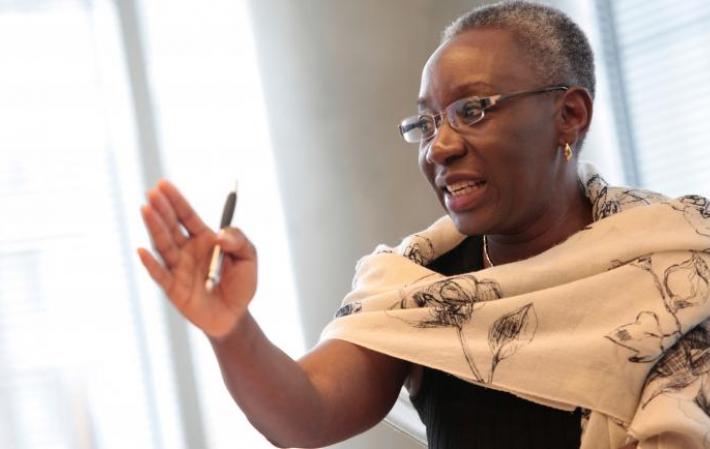
Sandra Pepera, Senior Associate and Director for NDI's Gender, Women and Democracy team.
---day-before-elections.png)
Larry Garber meeting with Jose Concepcion Jr, the first chair of NAMFREL on the day before the 2016 Philippines elections
The 1986 Philippines snap presidential election serves as a lodestar for international democratic activists who came of age professionally during the 1980s. The successful People Power Revolution demonstrated the role that electoral participation could play in mobilizing a population to reject a fraudulent process and to overthrow a dictator. And it introduced the international community to such concepts as “domestic election monitoring” and “parallel vote tabulations,” which are now core components of the menu used by democracy promoters around the globe. Indeed, since 1986, Filipino activists have frequently been called upon to share their experiences with those contemplating how best to challenge entrenched authoritarian regimes. I observed these developments in the Philippines first-hand.
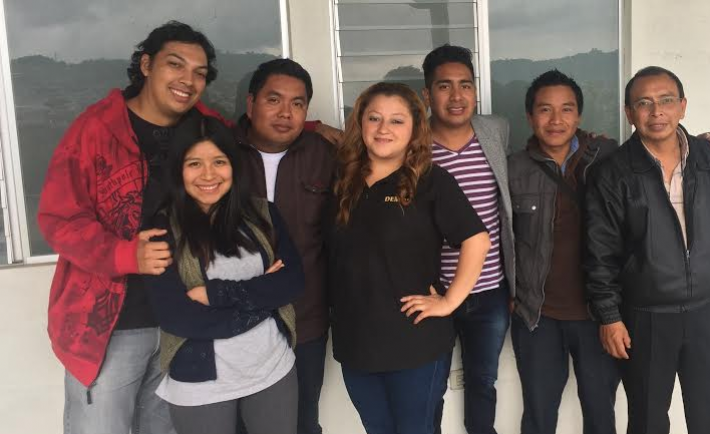
Members of the DEMOS network. Left to right: Jorge Barriento, Aracsala Chang, Orlando Cun, Yesica Hernandez, Fredy Sitavi, Jose Cuxil, and Ronald Baldomiro.
For Yesica Hernández, an observer from Quetzaltenango, playing an active role in political life in her country is a civic obligation. At just 24 years old, Yesica has worked with the Central American Institute for the Study of Social Democracy (DEMOS) for nearly five years and already observed two elections. She sees election observation as critical to involving citizens, especially youth, in politics and holding political parties and politicians accountable to the public.
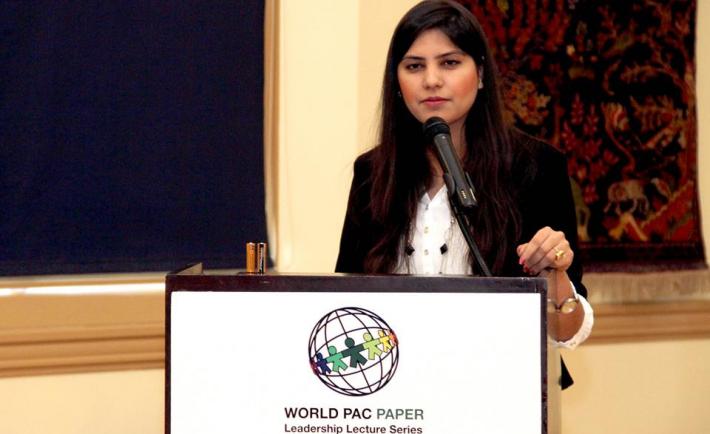
Sehrish Naseem, the 2016 Andi Parhamovich Fellow, at Marietta College Speaking about Young Pakistani Women Leading Transition in Their Society.
One day at breakfast when I was 23 years old I asked my father, “Papa, why is not aunty considering to contest the general elections, even though she is an active member of our community?” A smile appeared on his face and replied, “because if she does our community will stop considering her a woman.” My aunt was not a politician, but as an opinionated and socially active woman with a deep understanding of the issues facing Pakistan, I thought she should be. This was the moment I came to believe that democracy cannot exist without empowered women. And empowerment comes through women’s access to education, health, and employment because it creates space for them to play an active political role.
Macedonia became independent when Yugoslavia disintegrated 25 years ago. Many thought that Macedonia might not survive as a new country. It was in a tough neighborhood, the economy was in tatters, it had little experience with democracy, and there was a strong undercurrent of tension between the majority Macedonian population and a large Albanian minority.
But Macedonia did overcome those early challenges, got to work on its new democracy, and as a result it has progressed toward European Union and NATO membership.
We are living in a time where people are pretty down on Washington. Around the world, the U.S. Congress has become better known for partisanship than as a beacon of democracy. Still, I am proud to be part of a bipartisan group of women senators who are a part of the solution, proving that civility and effectiveness in politics is not a thing of the past.
Equal participation of citizens in politics is essential for strengthening democracy. Citizen participation must be inclusive, representative and intercultural. One of the foundations of democracy is respect for human rights, which includes recognition of individual and collective rights of indigenous peoples. And one of these collective rights lies precisely in the use of indigenous languages. This is especially true in Guatemala, where indigenous peoples represent a large and diverse, but frequently marginalized, population.
Louis Enrique Borrayo Hernandez is a young Guatemalan man who learned about the election observation through Association Ixim, the local organization that supported Citizen Action’s (AC) observation in the department of Sacatepéquez, just outside of Guatemala’s capital. We recently spoke with Louis, as well as his colleague Theylor (who preferred that we not use his full name), about why they decided to join the AC network as long-term observers. Their answer was clear: “we wanted to make a difference in our community and our country,” they both agreed.
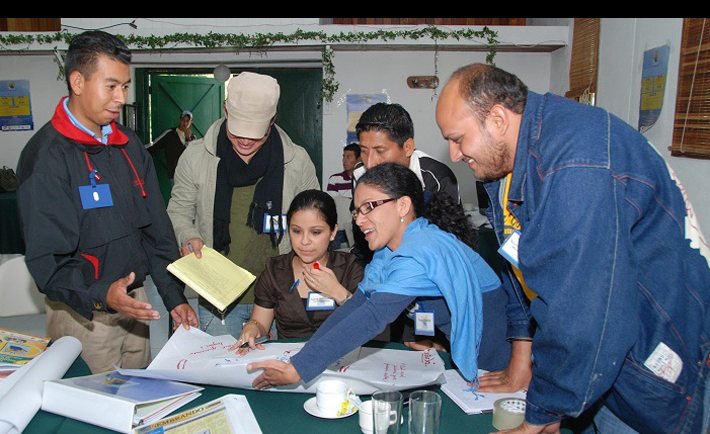
During the strategic planning session of NDI Nicaragua's Certificate in Leadership and Political Management (CLPM) program, a group of participants from several civil society organizations (CSOs) work together to create a problem tree.
Each week NDI’s Citizen Participation team provides a resource to assist NDI staff in meeting the objectives of their programs. This past month’s resources analyzed how to make politically informed decisions when implementing development programs, outlined key principles to guide the effective use of Theories of Change, conveyed evidence-based recommendations on the dynamic between democratization initiatives and violent conflict, and reviewed how digital information and communications technologies (ICTs) can impact development and inequality. These resources provide CSOs and practitioners with tools and insights for implementing politically smart, culturally informed and effective development practices and programs.
_1_1.jpg)
A Mayan ceremony celebrating the launch of the “Less Violence, More Inclusion” observation effort in Nebaj, Quiche, Guatemala, to reduce election violence and illegal campaign activity leading up to the Sept. 6 presidential election.
The Network of Ixiles Women is based in Nebaj, which is located in a remote valley in the Ixil area of the department of Quiché, Guatemala -- a region that is predominately Maya-Ixil. The organization was one of 13 local groups that partnered with Citizen Action (AC) to observe electoral violence and campaign spending across 20 municipalities. We recently spoke with the organization’s coordinator, Juana Baca, as well as two observers, Paula Ramírez and Andrés Saquic, about their experience participating in the “More Inclusion, Less Violence” electoral observation network.
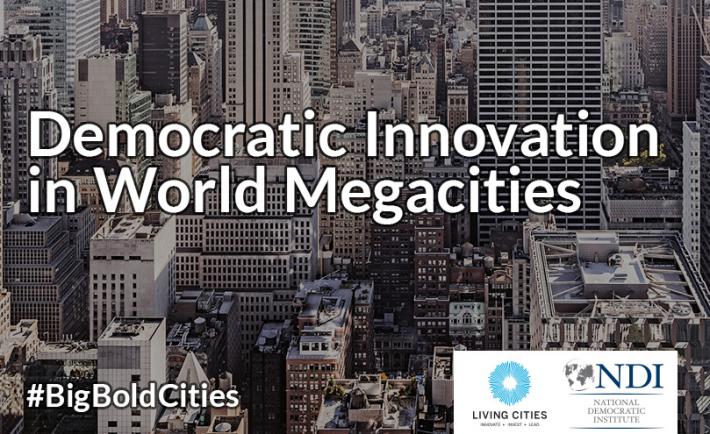
Living Cities and NDI have entered a partnership to find and share the stories of innovators in world megacities.
Every 20 years, the United Nations gathers to discuss the work of cities and renew political commitment to sustainable urbanization. In this year of the third Habitat conference, there is a vibrant global conversation happening around poverty reduction and a “new urban agenda.” Innovation will be a critical part of that conversation, as leaders and policymakers look for the new regulation, new office or new technology that could pick the lock on an intractable problem.
The ability to innovate is absolutely critical if cities are going to meet the ever-evolving challenges of the 21st century.